Don't wanna be here? Send us removal request.
Text
The Evolution of Digital Marketing: Past, Present, and Future
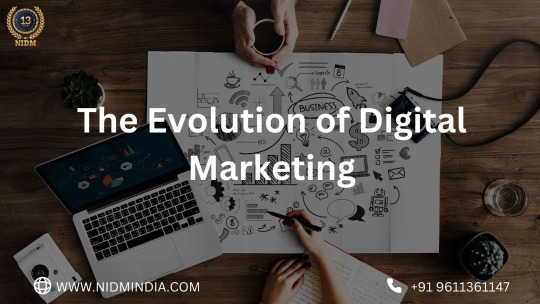
Digital marketing has undergone a remarkable transformation since its inception, evolving in tandem with technological advancements and changing consumer behaviors. This evolution from the early days of the internet to today's sophisticated strategies and tools highlights the dynamic nature of digital marketing. Understanding this journey is essential for businesses aiming to thrive in the digital age.
The Past: The Beginnings of Digital Marketing
The 1990s: Early Internet and Email Marketing
The roots of digital marketing trace back to the 1990s with the widespread adoption of the internet. Email marketing emerged as the first recognizable form of digital marketing. Businesses started using email to communicate with customers, though early efforts were often seen as spam.
The advent of search engines, beginning with Archie and later Yahoo and Google, revolutionized information retrieval and laid the foundation for search engine optimization (SEO). The first clickable banner ad appeared in 1994, marking the birth of online advertising. These ads, while basic, opened new avenues for businesses to reach potential customers.
Dot-Com Boom and Social Media’s Genesis
The late 1990s saw the dot-com boom, characterized by significant investments in online businesses. This period saw the rise of e-commerce giants like Amazon and eBay. However, the subsequent dot-com bust in the early 2000s led to a more cautious approach to digital investments.
The mid-2000s marked the emergence of social media platforms. MySpace, followed by Facebook and Twitter, changed the way people interacted online. Businesses began leveraging these platforms to engage with customers in more personal and interactive ways, setting the stage for social media marketing.
The Present: The Data-Driven Era
Advanced SEO and SEM
Today, SEO has evolved into a sophisticated practice focused on user experience and high-quality content. Search engine marketing (SEM), including pay-per-click (PPC) advertising, has become a cornerstone of digital marketing strategies. Google AdWords, introduced in 2000, revolutionized the PPC model, allowing businesses to bid for ad placements with precise targeting.
Social Media and Influencer Marketing
Social media platforms have become indispensable tools for marketers. Facebook, Instagram, LinkedIn, and TikTok offer highly targeted advertising options, allowing businesses to reach specific demographics effectively. Influencer marketing has also gained prominence, with brands partnering with influencers to tap into their loyal followings.
Content Marketing
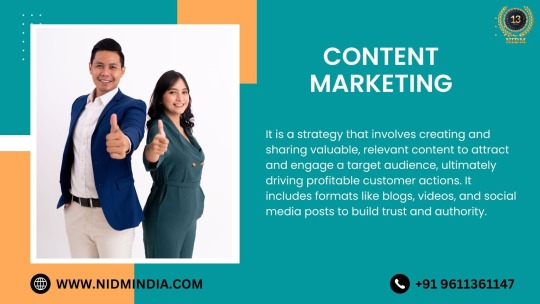
Content marketing is central to modern digital strategies. High-quality blogs, videos, podcasts, and infographics engage and educate customers, building trust and authority. Effective content marketing drives organic traffic through SEO and enhances engagement on social media.
Email Marketing
Email marketing remains a vital component of digital marketing. Segmentation and automation have transformed email campaigns, enabling personalized and timely communication. Platforms like Mailchimp and HubSpot offer advanced features to optimize email marketing efforts.
Data Analytics
Data analytics plays a crucial role in contemporary digital marketing. Tools like Google Analytics and Adobe Analytics provide deep insights into consumer behavior, campaign performance, and ROI. Data-driven decision-making allows marketers to optimize strategies and enhance customer experiences.
Mobile Marketing
With the proliferation of smartphones, mobile marketing has become essential. Mobile-friendly websites, apps, SMS marketing, and location-based services are crucial components. Google’s mobile-first indexing underscores the importance of mobile optimization for SEO.
Video Marketing
Video content is more popular than ever, with platforms like YouTube, TikTok, and Instagram Reels leading the charge. Live streaming and webinars offer interactive ways to engage audiences, making video a powerful tool for digital marketing.
Artificial Intelligence and Machine Learning
AI and machine learning are transforming digital marketing. Chatbots provide instant customer support, predictive analytics forecast trends, and AI-driven tools enhance personalization. Programmatic advertising uses AI to automate ad buying, ensuring precise targeting.
The Future: Innovations and Trends
Voice Search and Smart Speakers
Voice search is set to play a significant role in the future of digital marketing. With the growing use of smart speakers like Amazon Echo and Google Home, optimizing content for voice search is becoming increasingly important. This involves focusing on natural language and long-tail keywords.
Augmented Reality (AR) and Virtual Reality (VR)
AR and VR are poised to revolutionize customer experiences. AR can allow customers to visualize products in their environment before purchasing, while VR can offer immersive experiences such as virtual store tours or product demonstrations.
Hyper-Personalization
The future of digital marketing lies in hyper-personalization. Advanced data analytics and AI will enable marketers to create highly personalized experiences for consumers, tailoring content, offers, and communication based on individual preferences and behaviors.
Blockchain Technology
Blockchain technology is expected to impact digital marketing significantly. It can enhance transparency and security in digital advertising, reducing fraud. Blockchain can also give users more control over their data, ensuring privacy and building trust.
5G Technology
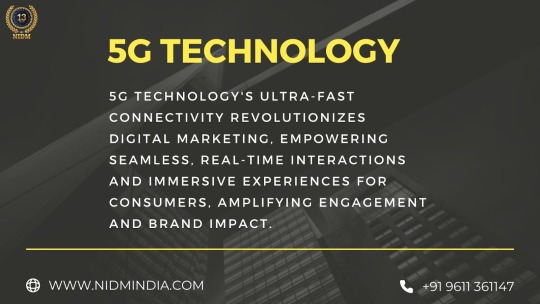
The rollout of 5G technology will accelerate the speed and efficiency of digital marketing. Faster internet speeds will enhance user experiences, enabling more sophisticated and real-time interactions, such as high-quality video streaming and augmented reality applications.
Ethical Marketing and Data Privacy
As consumers become more aware of data privacy issues, ethical marketing practices will gain prominence. Marketers will need to ensure transparency and compliance with regulations like GDPR and CCPA. Building trust through ethical practices will be crucial for long-term success.
Integrated Marketing Strategies
The future will see a more integrated approach to digital marketing. Businesses will combine various channels and technologies to create cohesive and seamless customer experiences. Omnichannel marketing, which provides a unified customer experience across all touchpoints, will become the norm.
Sustainable Marketing
Sustainability will become a key consideration in digital marketing strategies. Consumers increasingly value brands that demonstrate social and environmental responsibility. Marketers will need to highlight sustainable practices and communicate their commitment to social causes.
Conclusion
The evolution of digital marketing from its early days in the 1990s to the sophisticated, data-driven strategies of today highlights its dynamic nature. As technology continues to advance, digital marketing, including digital marketing classes in Bangalore, will evolve, offering new opportunities and challenges. Staying informed about past developments and future trends is essential for businesses aiming to succeed in this ever-changing landscape.
Embracing innovations like AI, voice search, AR, and ethical marketing practices will be crucial. By understanding and adapting to these changes, businesses can leverage digital marketing to build stronger customer relationships, enhance brand loyalty, and drive growth in an increasingly digital world.
digital marketing classes in Bangalore
0 notes
Text
The Importance of Digital Marketing in Today’s Business Landscape

Introduction
In the digital era, where consumers are constantly connected to the internet, digital marketing has emerged as an indispensable tool for businesses. Whether you're a small startup or a large corporation, understanding the significance of digital marketing can help you reach a broader audience, increase sales, and build a lasting brand. This blog post delves into the key reasons why digital marketing is crucial for modern businesses.
Wider Reach and Global Audience
One of the most compelling advantages of digital marketing is its ability to reach a global audience. Unlike traditional marketing methods, which are often limited by geography, digital marketing leverages the internet to connect with potential customers worldwide. Social media platforms, search engines, and email marketing allow businesses to target and engage with audiences across different regions, breaking down geographical barriers and expanding market reach.
Cost-Effectiveness
Digital marketing offers a cost-effective solution compared to traditional marketing channels such as television, radio, and print media. Small businesses, in particular, can benefit from digital marketing's affordability. For example, social media advertising, pay-per-click (PPC) campaigns, and email marketing often require lower budgets while delivering high returns on investment (ROI). This democratizes marketing, enabling businesses of all sizes to compete on a level playing field.
Measurable Results and Analytics
One of the standout features of digital marketing is the ability to track and measure campaign performance in real-time. Tools like Google Analytics, social media analytics, and email marketing software provide detailed insights into key metrics such as website traffic, conversion rates, and customer engagement. This data-driven approach allows businesses to make informed decisions, optimize strategies, and allocate resources more effectively, ensuring maximum impact and ROI.
Targeted Marketing and Personalization
Digital marketing excels in its ability to deliver highly targeted and personalized campaigns. By leveraging data and analytics, businesses can segment their audience based on demographics, interests, behavior, and more. This precision targeting ensures that marketing messages resonate with the right people at the right time. Personalized marketing not only enhances the customer experience but also increases the likelihood of conversions and brand loyalty.
Enhanced Customer Engagement
In the digital age, customer engagement is more important than ever. Social media platforms, blogs, and email campaigns provide opportunities for direct interaction with customers. Businesses can respond to queries, gather feedback, and build relationships through consistent and meaningful engagement. This two-way communication helps foster trust and loyalty, turning customers into brand advocates.
Brand Awareness and Online Presence
Building a strong online presence is essential for brand awareness. Digital marketing strategies such as content marketing, social media marketing, and search engine optimization (SEO) help businesses establish and maintain visibility online. A robust online presence ensures that your brand remains top-of-mind for consumers and can influence their purchasing decisions. Moreover, an active online presence allows for better reputation management by addressing negative feedback and promoting positive experiences.
Flexibility and Adaptability
The digital landscape is ever-changing, and digital marketing provides the flexibility to adapt quickly. Whether it's a new social media trend, an algorithm update, or an emerging platform, businesses can adjust their strategies to stay relevant. This adaptability is crucial in a dynamic market where consumer preferences and behaviors are constantly evolving.
Higher Conversion Rates
Digital marketing strategies often result in higher conversion rates compared to traditional marketing methods. By targeting the right audience with relevant content and offers, businesses can effectively drive conversions. Techniques such as SEO, content marketing, and email marketing are particularly effective in guiding potential customers through the sales funnel and converting them into loyal clients.
Competitive Analysis and Insights
Digital marketing tools allow businesses to monitor and analyze competitors' activities. Understanding competitors' strategies can provide valuable insights and highlight opportunities for differentiation. Tools like SEMrush, Ahrefs, and social media monitoring software help businesses analyze competitors' SEO efforts, content strategies, and social media performance, enabling them to stay ahead of the curve.
Sustainability and Long-Term Growth
Investing in digital marketing supports sustainable growth by building a strong online foundation. Content marketing, for instance, involves creating valuable content that continues to attract and engage users over time. Similarly, SEO efforts can result in long-lasting organic search visibility. These strategies contribute to a steady influx of traffic and leads, ensuring sustained business growth.
Conclusion
Best Digital marketing courses is a powerful tool that offers numerous benefits, from expanding reach and enhancing customer engagement to providing measurable results and supporting long-term growth. In today's competitive business environment, leveraging digital marketing is not just an option but a necessity. By embracing digital marketing strategies, businesses can stay relevant, connect with their audience, and achieve lasting success.
Best Digital Marketing Training Institute in Bangalore
0 notes
Text
best digital marketing courses

best digital marketing courses
NIDM (National Institute Of Digital Marketing) Bangalore Is One Of The Leading & best Digital Marketing Institute In Bangalore, India And We Have Brand Value For The Quality Of Education Which We Provide. Our Curriculum/ Courses Are Designed with Practical knowledge are Fully For Job Orientation Bases. We have the best curriculum, trainers and unlimited practical hours on live project.
0 notes
Text
The Evolution of Digital Marketing: Past, Present, and Future
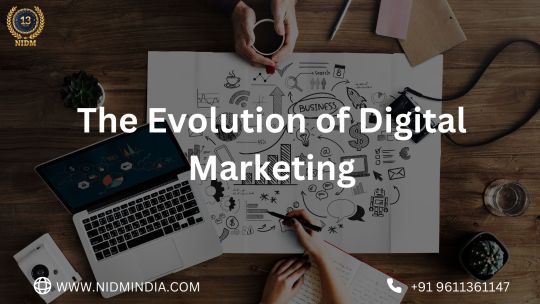
Digital marketing has undergone a remarkable transformation since its inception, evolving in tandem with technological advancements and changing consumer behaviors. This evolution from the early days of the internet to today's sophisticated strategies and tools highlights the dynamic nature of digital marketing. Understanding this journey is essential for businesses aiming to thrive in the digital age.
The Past: The Beginnings of Digital Marketing
The 1990s: Early Internet and Email Marketing
The roots of digital marketing trace back to the 1990s with the widespread adoption of the internet. Email marketing emerged as the first recognizable form of digital marketing. Businesses started using email to communicate with customers, though early efforts were often seen as spam.
The advent of search engines, beginning with Archie and later Yahoo and Google, revolutionized information retrieval and laid the foundation for search engine optimization (SEO). The first clickable banner ad appeared in 1994, marking the birth of online advertising. These ads, while basic, opened new avenues for businesses to reach potential customers.
Dot-Com Boom and Social Media’s Genesis
The late 1990s saw the dot-com boom, characterized by significant investments in online businesses. This period saw the rise of e-commerce giants like Amazon and eBay. However, the subsequent dot-com bust in the early 2000s led to a more cautious approach to digital investments.
The mid-2000s marked the emergence of social media platforms. MySpace, followed by Facebook and Twitter, changed the way people interacted online. Businesses began leveraging these platforms to engage with customers in more personal and interactive ways, setting the stage for social media marketing.
The Present: The Data-Driven Era
Advanced SEO and SEM
Today, SEO has evolved into a sophisticated practice focused on user experience and high-quality content. Search engine marketing (SEM), including pay-per-click (PPC) advertising, has become a cornerstone of digital marketing strategies. Google AdWords, introduced in 2000, revolutionized the PPC model, allowing businesses to bid for ad placements with precise targeting.
Social Media and Influencer Marketing
Social media platforms have become indispensable tools for marketers. Facebook, Instagram, LinkedIn, and TikTok offer highly targeted advertising options, allowing businesses to reach specific demographics effectively. Influencer marketing has also gained prominence, with brands partnering with influencers to tap into their loyal followings.
Content Marketing
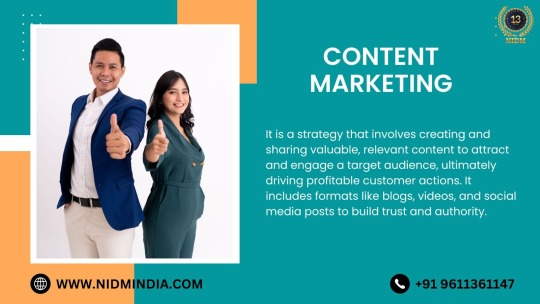
Content marketing is central to modern digital strategies. High-quality blogs, videos, podcasts, and infographics engage and educate customers, building trust and authority. Effective content marketing drives organic traffic through SEO and enhances engagement on social media.
Email Marketing
Email marketing remains a vital component of digital marketing. Segmentation and automation have transformed email campaigns, enabling personalized and timely communication. Platforms like Mailchimp and HubSpot offer advanced features to optimize email marketing efforts.
Data Analytics
Data analytics plays a crucial role in contemporary digital marketing. Tools like Google Analytics and Adobe Analytics provide deep insights into consumer behavior, campaign performance, and ROI. Data-driven decision-making allows marketers to optimize strategies and enhance customer experiences.
Mobile Marketing
With the proliferation of smartphones, mobile marketing has become essential. Mobile-friendly websites, apps, SMS marketing, and location-based services are crucial components. Google’s mobile-first indexing underscores the importance of mobile optimization for SEO.
Video Marketing
Video content is more popular than ever, with platforms like YouTube, TikTok, and Instagram Reels leading the charge. Live streaming and webinars offer interactive ways to engage audiences, making video a powerful tool for digital marketing.
Artificial Intelligence and Machine Learning
AI and machine learning are transforming digital marketing. Chatbots provide instant customer support, predictive analytics forecast trends, and AI-driven tools enhance personalization. Programmatic advertising uses AI to automate ad buying, ensuring precise targeting.
The Future: Innovations and Trends
Voice Search and Smart Speakers
Voice search is set to play a significant role in the future of digital marketing. With the growing use of smart speakers like Amazon Echo and Google Home, optimizing content for voice search is becoming increasingly important. This involves focusing on natural language and long-tail keywords.
Augmented Reality (AR) and Virtual Reality (VR)
AR and VR are poised to revolutionize customer experiences. AR can allow customers to visualize products in their environment before purchasing, while VR can offer immersive experiences such as virtual store tours or product demonstrations.
Hyper-Personalization
The future of digital marketing lies in hyper-personalization. Advanced data analytics and AI will enable marketers to create highly personalized experiences for consumers, tailoring content, offers, and communication based on individual preferences and behaviors.
Blockchain Technology
Blockchain technology is expected to impact digital marketing significantly. It can enhance transparency and security in digital advertising, reducing fraud. Blockchain can also give users more control over their data, ensuring privacy and building trust.
5G Technology

The rollout of 5G technology will accelerate the speed and efficiency of digital marketing. Faster internet speeds will enhance user experiences, enabling more sophisticated and real-time interactions, such as high-quality video streaming and augmented reality applications.
Ethical Marketing and Data Privacy
As consumers become more aware of data privacy issues, ethical marketing practices will gain prominence. Marketers will need to ensure transparency and compliance with regulations like GDPR and CCPA. Building trust through ethical practices will be crucial for long-term success.
Integrated Marketing Strategies
The future will see a more integrated approach to digital marketing. Businesses will combine various channels and technologies to create cohesive and seamless customer experiences. Omnichannel marketing, which provides a unified customer experience across all touchpoints, will become the norm.
Sustainable Marketing
Sustainability will become a key consideration in digital marketing strategies. Consumers increasingly value brands that demonstrate social and environmental responsibility. Marketers will need to highlight sustainable practices and communicate their commitment to social causes.
Conclusion
The evolution of digital marketing from its early days in the 1990s to the sophisticated, data-driven strategies of today highlights its dynamic nature. As technology continues to advance, digital marketing, including digital marketing classes in Bangalore, will evolve, offering new opportunities and challenges. Staying informed about past developments and future trends is essential for businesses aiming to succeed in this ever-changing landscape.
Embracing innovations like AI, voice search, AR, and ethical marketing practices will be crucial. By understanding and adapting to these changes, businesses can leverage digital marketing to build stronger customer relationships, enhance brand loyalty, and drive growth in an increasingly digital world.
0 notes
Text
The Evolution of Digital Marketing: Past, Present, and Future

Digital marketing has undergone a remarkable transformation since its inception, evolving in tandem with technological advancements and changing consumer behaviors. This evolution from the early days of the internet to today's sophisticated strategies and tools highlights the dynamic nature of digital marketing. Understanding this journey is essential for businesses aiming to thrive in the digital age.
The Past: The Beginnings of Digital Marketing
The 1990s: Early Internet and Email Marketing
The roots of digital marketing trace back to the 1990s with the widespread adoption of the internet. Email marketing emerged as the first recognizable form of digital marketing. Businesses started using email to communicate with customers, though early efforts were often seen as spam.
The advent of search engines, beginning with Archie and later Yahoo and Google, revolutionized information retrieval and laid the foundation for search engine optimization (SEO). The first clickable banner ad appeared in 1994, marking the birth of online advertising. These ads, while basic, opened new avenues for businesses to reach potential customers.
Dot-Com Boom and Social Media’s Genesis
The late 1990s saw the dot-com boom, characterized by significant investments in online businesses. This period saw the rise of e-commerce giants like Amazon and eBay. However, the subsequent dot-com bust in the early 2000s led to a more cautious approach to digital investments.
The mid-2000s marked the emergence of social media platforms. MySpace, followed by Facebook and Twitter, changed the way people interacted online. Businesses began leveraging these platforms to engage with customers in more personal and interactive ways, setting the stage for social media marketing.
The Present: The Data-Driven Era
Advanced SEO and SEM
Today, SEO has evolved into a sophisticated practice focused on user experience and high-quality content. Search engine marketing (SEM), including pay-per-click (PPC) advertising, has become a cornerstone of digital marketing strategies. Google AdWords, introduced in 2000, revolutionized the PPC model, allowing businesses to bid for ad placements with precise targeting.
Social Media and Influencer Marketing
Social media platforms have become indispensable tools for marketers. Facebook, Instagram, LinkedIn, and TikTok offer highly targeted advertising options, allowing businesses to reach specific demographics effectively. Influencer marketing has also gained prominence, with brands partnering with influencers to tap into their loyal followings.
Content Marketing

Content marketing is central to modern digital strategies. High-quality blogs, videos, podcasts, and infographics engage and educate customers, building trust and authority. Effective content marketing drives organic traffic through SEO and enhances engagement on social media.
Email Marketing
Email marketing remains a vital component of digital marketing. Segmentation and automation have transformed email campaigns, enabling personalized and timely communication. Platforms like Mailchimp and HubSpot offer advanced features to optimize email marketing efforts.
Data Analytics
Data analytics plays a crucial role in contemporary digital marketing. Tools like Google Analytics and Adobe Analytics provide deep insights into consumer behavior, campaign performance, and ROI. Data-driven decision-making allows marketers to optimize strategies and enhance customer experiences.
Mobile Marketing
With the proliferation of smartphones, mobile marketing has become essential. Mobile-friendly websites, apps, SMS marketing, and location-based services are crucial components. Google’s mobile-first indexing underscores the importance of mobile optimization for SEO.
Video Marketing
Video content is more popular than ever, with platforms like YouTube, TikTok, and Instagram Reels leading the charge. Live streaming and webinars offer interactive ways to engage audiences, making video a powerful tool for digital marketing.
Artificial Intelligence and Machine Learning
AI and machine learning are transforming digital marketing. Chatbots provide instant customer support, predictive analytics forecast trends, and AI-driven tools enhance personalization. Programmatic advertising uses AI to automate ad buying, ensuring precise targeting.
The Future: Innovations and Trends
Voice Search and Smart Speakers
Voice search is set to play a significant role in the future of digital marketing. With the growing use of smart speakers like Amazon Echo and Google Home, optimizing content for voice search is becoming increasingly important. This involves focusing on natural language and long-tail keywords.
Augmented Reality (AR) and Virtual Reality (VR)
AR and VR are poised to revolutionize customer experiences. AR can allow customers to visualize products in their environment before purchasing, while VR can offer immersive experiences such as virtual store tours or product demonstrations.
Hyper-Personalization
The future of digital marketing lies in hyper-personalization. Advanced data analytics and AI will enable marketers to create highly personalized experiences for consumers, tailoring content, offers, and communication based on individual preferences and behaviors.
Blockchain Technology
Blockchain technology is expected to impact digital marketing significantly. It can enhance transparency and security in digital advertising, reducing fraud. Blockchain can also give users more control over their data, ensuring privacy and building trust.
5G Technology

The rollout of 5G technology will accelerate the speed and efficiency of digital marketing. Faster internet speeds will enhance user experiences, enabling more sophisticated and real-time interactions, such as high-quality video streaming and augmented reality applications.
Ethical Marketing and Data Privacy
As consumers become more aware of data privacy issues, ethical marketing practices will gain prominence. Marketers will need to ensure transparency and compliance with regulations like GDPR and CCPA. Building trust through ethical practices will be crucial for long-term success.
Integrated Marketing Strategies
The future will see a more integrated approach to digital marketing. Businesses will combine various channels and technologies to create cohesive and seamless customer experiences. Omnichannel marketing, which provides a unified customer experience across all touchpoints, will become the norm.
Sustainable Marketing
Sustainability will become a key consideration in digital marketing strategies. Consumers increasingly value brands that demonstrate social and environmental responsibility. Marketers will need to highlight sustainable practices and communicate their commitment to social causes.
Conclusion
The evolution of digital marketing from its early days in the 1990s to the sophisticated, data-driven strategies of today highlights its dynamic nature. As technology continues to advance, digital marketing, including digital marketing classes in Bangalore, will evolve, offering new opportunities and challenges. Staying informed about past developments and future trends is essential for businesses aiming to succeed in this ever-changing landscape.
Embracing innovations like AI, voice search, AR, and ethical marketing practices will be crucial. By understanding and adapting to these changes, businesses can leverage digital marketing to build stronger customer relationships, enhance brand loyalty, and drive growth in an increasingly digital world.
Best Digital Marketing Training Institute in Bangalore
0 notes
Text
The Importance of Digital Marketing in Today’s Business Landscape

Introduction
In the digital era, where consumers are constantly connected to the internet, digital marketing has emerged as an indispensable tool for businesses. Whether you're a small startup or a large corporation, understanding the significance of digital marketing can help you reach a broader audience, increase sales, and build a lasting brand. This blog post delves into the key reasons why digital marketing is crucial for modern businesses.
Wider Reach and Global Audience
One of the most compelling advantages of digital marketing is its ability to reach a global audience. Unlike traditional marketing methods, which are often limited by geography, digital marketing leverages the internet to connect with potential customers worldwide. Social media platforms, search engines, and email marketing allow businesses to target and engage with audiences across different regions, breaking down geographical barriers and expanding market reach.
Cost-Effectiveness
Digital marketing offers a cost-effective solution compared to traditional marketing channels such as television, radio, and print media. Small businesses, in particular, can benefit from digital marketing's affordability. For example, social media advertising, pay-per-click (PPC) campaigns, and email marketing often require lower budgets while delivering high returns on investment (ROI). This democratizes marketing, enabling businesses of all sizes to compete on a level playing field.
Measurable Results and Analytics
One of the standout features of digital marketing is the ability to track and measure campaign performance in real-time. Tools like Google Analytics, social media analytics, and email marketing software provide detailed insights into key metrics such as website traffic, conversion rates, and customer engagement. This data-driven approach allows businesses to make informed decisions, optimize strategies, and allocate resources more effectively, ensuring maximum impact and ROI.
Targeted Marketing and Personalization
Digital marketing excels in its ability to deliver highly targeted and personalized campaigns. By leveraging data and analytics, businesses can segment their audience based on demographics, interests, behavior, and more. This precision targeting ensures that marketing messages resonate with the right people at the right time. Personalized marketing not only enhances the customer experience but also increases the likelihood of conversions and brand loyalty.
Enhanced Customer Engagement
In the digital age, customer engagement is more important than ever. Social media platforms, blogs, and email campaigns provide opportunities for direct interaction with customers. Businesses can respond to queries, gather feedback, and build relationships through consistent and meaningful engagement. This two-way communication helps foster trust and loyalty, turning customers into brand advocates.
Brand Awareness and Online Presence
Building a strong online presence is essential for brand awareness. Digital marketing strategies such as content marketing, social media marketing, and search engine optimization (SEO) help businesses establish and maintain visibility online. A robust online presence ensures that your brand remains top-of-mind for consumers and can influence their purchasing decisions. Moreover, an active online presence allows for better reputation management by addressing negative feedback and promoting positive experiences.
Flexibility and Adaptability
The digital landscape is ever-changing, and digital marketing provides the flexibility to adapt quickly. Whether it's a new social media trend, an algorithm update, or an emerging platform, businesses can adjust their strategies to stay relevant. This adaptability is crucial in a dynamic market where consumer preferences and behaviors are constantly evolving.
Higher Conversion Rates
Digital marketing strategies often result in higher conversion rates compared to traditional marketing methods. By targeting the right audience with relevant content and offers, businesses can effectively drive conversions. Techniques such as SEO, content marketing, and email marketing are particularly effective in guiding potential customers through the sales funnel and converting them into loyal clients.
Competitive Analysis and Insights
Digital marketing tools allow businesses to monitor and analyze competitors' activities. Understanding competitors' strategies can provide valuable insights and highlight opportunities for differentiation. Tools like SEMrush, Ahrefs, and social media monitoring software help businesses analyze competitors' SEO efforts, content strategies, and social media performance, enabling them to stay ahead of the curve.
Sustainability and Long-Term Growth
Investing in digital marketing supports sustainable growth by building a strong online foundation. Content marketing, for instance, involves creating valuable content that continues to attract and engage users over time. Similarly, SEO efforts can result in long-lasting organic search visibility. These strategies contribute to a steady influx of traffic and leads, ensuring sustained business growth.
Conclusion
Best Digital marketing courses is a powerful tool that offers numerous benefits, from expanding reach and enhancing customer engagement to providing measurable results and supporting long-term growth. In today's competitive business environment, leveraging digital marketing is not just an option but a necessity. By embracing digital marketing strategies, businesses can stay relevant, connect with their audience, and achieve lasting success.
Best Digital Marketing Training Institute in Bangalore
0 notes
Text
Rare marketing strategy from Rare Rabbit
Digital Marketing Course In Bangalore
0 notes
Text

digital marketing classes in Bangalore
NIDM (National Institute Of Digital Marketing) Bangalore Is One Of The Leading & best Digital Marketing Institute In Bangalore, India And We Have Brand Value For The Quality Of Education Which We Provide. Our Curriculum/ Courses Are Designed with Practical knowledge are Fully For Job Orientation Bases. We have the best curriculum, trainers and unlimited practical hours on live project.
0 notes
Text

Best digital marketing courses NIDM (National Institute Of Digital Marketing) Bangalore Is One Of The Leading & best Digital Marketing Institute In Bangalore, India And We Have Brand Value For The Quality Of Education Which We Provide. Our Curriculum/ Courses Are Designed with Practical knowledge are Fully For Job Orientation Bases. We have the best curriculum, trainers and unlimited practical hours on live project.
1 note
·
View note